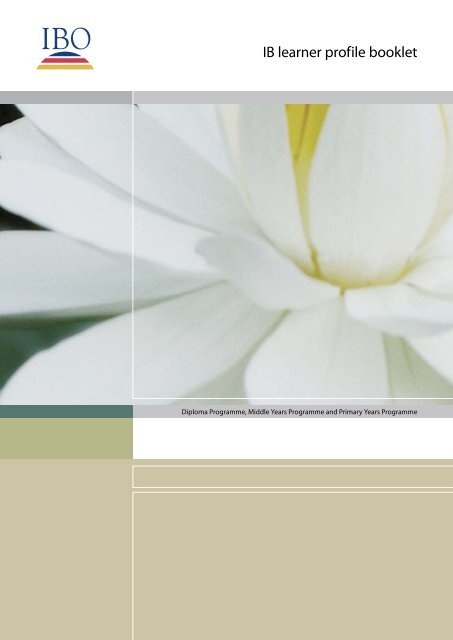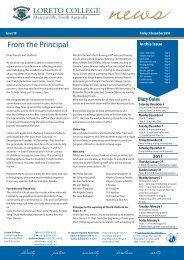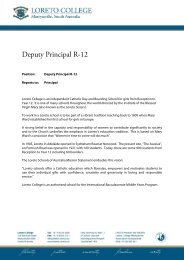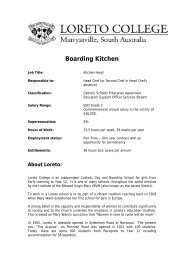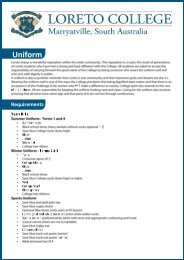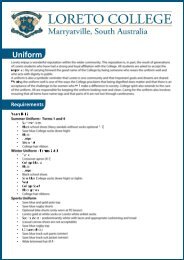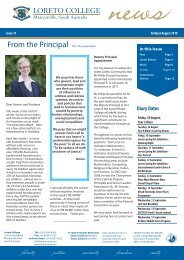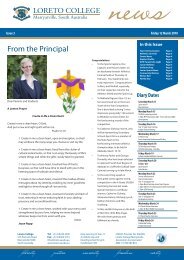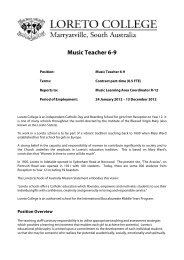IB learner profile booklet
IB learner profile booklet
IB learner profile booklet
Create successful ePaper yourself
Turn your PDF publications into a flip-book with our unique Google optimized e-Paper software.
<strong>IB</strong> <strong>learner</strong> <strong>profile</strong> <strong>booklet</strong>Diploma Programme, Middle Years Programme and Primary Years Programme
<strong>IB</strong> <strong>learner</strong> <strong>profile</strong> <strong>booklet</strong>International Baccalaureate OrganizationBuenos Aires Cardiff Geneva New York Singapore
<strong>IB</strong> <strong>learner</strong> <strong>profile</strong> <strong>booklet</strong>Published March 2006International Baccalaureate OrganizationPeterson House, Malthouse Avenue, Cardiff GateCardiff, Wales GB CF23 8GLUnited KingdomPhone: + 44 29 2054 7777Fax: + 44 29 2054 7778Web site: http://www.ibo.org© International Baccalaureate Organization 2006The International Baccalaureate Organization (<strong>IB</strong>O) was established in 1968 and isa non-profit, international educational foundation registered in Switzerland.The <strong>IB</strong>O is grateful for permission to reproduce and/or translate any copyrightmaterial used in this publication. Acknowledgments are included, whereappropriate, and, if notified, the <strong>IB</strong>O will be pleased to rectify any errors oromissions at the earliest opportunity.<strong>IB</strong>O merchandise and publications in its official and working languages can bepurchased through the <strong>IB</strong> store at http://store.ibo.org. General ordering queriesshould be directed to the sales and marketing department in Cardiff.Phone: +44 29 2054 7746Fax: +44 29 2054 7779E-mail: sales@ibo.orgPrinted in the United Kingdom by Antony Rowe Ltd, Chippenham, Wiltshire.NS284
<strong>IB</strong>O mission statementThe International Baccalaureate Organization aims to develop inquiring,knowledgeable and caring young people who help to create a better andmore peaceful world through intercultural understanding and respect.To this end the <strong>IB</strong>O works with schools, governments and internationalorganizations to develop challenging programmes of international educationand rigorous assessment.These programmes encourage students across the world to become active,compassionate and lifelong <strong>learner</strong>s who understand that other people, withtheir differences, can also be right.
<strong>IB</strong> <strong>learner</strong> <strong>profile</strong> <strong>booklet</strong>Introduction to the <strong>IB</strong> <strong>learner</strong> <strong>profile</strong>Nature of the <strong>IB</strong> <strong>learner</strong> <strong>profile</strong>The <strong>IB</strong> <strong>learner</strong> <strong>profile</strong> is the <strong>IB</strong>O mission statement translated into a set of learning outcomes for the 21stcentury. The attributes of the <strong>profile</strong> express the values inherent to the <strong>IB</strong> continuum of internationaleducation: these are values that should infuse all elements of the Primary Years Programme (PYP), MiddleYears Programme (MYP) and Diploma Programme and, therefore, the culture and ethos of all <strong>IB</strong> WorldSchools. The <strong>learner</strong> <strong>profile</strong> provides a long-term vision of education. It is a set of ideals that can inspire,motivate and focus the work of schools and teachers, uniting them in a common purpose.The <strong>IB</strong>O’s concept of an educational continuum, and of a coherent, broad-based international curriculum,was fully realized in 1997 with the introduction of the PYP. The <strong>IB</strong>O is now able to offer three programmes ofinternational education and, with them, the prospect of a continuous international educational experiencefrom early childhood to pre-university age. While the <strong>IB</strong>O now offers a sequence of three programmes—thePYP, the MYP (introduced in 1994) and the Diploma Programme (introduced in 1969)—each programmemust continue to be self-contained, since the <strong>IB</strong>O has no requirement for schools to offer more than oneprogramme. However, they must also form an articulated sequence for those schools that teach all threeprogrammes or any sequence of two.With the development of a continuum of international education, it is intended that teachers, students andparents will be able to draw confidently on a recognizable common educational framework, a consistentstructure of aims and values and an overarching concept of how to develop international-mindedness. The<strong>IB</strong> <strong>learner</strong> <strong>profile</strong> will be at the heart of this common framework, as a clear and concise statement of theaims and values of the <strong>IB</strong>O, and an embodiment of what the <strong>IB</strong>O means by “international-mindedness”.Aims of the <strong>IB</strong> <strong>learner</strong> <strong>profile</strong>The attributes and descriptors of the <strong>learner</strong> <strong>profile</strong> define the type of <strong>learner</strong> the <strong>IB</strong>O hopes to developthrough its programmes. It originated in the PYP where it was called the “PYP student <strong>profile</strong>”, butpractitioners from all three programmes identified it as a set of qualities that could also enhance learning inthe MYP and the Diploma Programme—learning that should not come to a stop at the age of 11, but shouldcarry through to the completion of the Diploma Programme. It is now called the “<strong>IB</strong> <strong>learner</strong> <strong>profile</strong>” to makeit applicable to all students and adults involved in the implementation of <strong>IB</strong> programmes, that is, to the <strong>IB</strong>Ocommunity of <strong>learner</strong>s.PYP curriculum documents describe the PYP student <strong>profile</strong> as “the common ground on which PYP schoolsstand, the essence of what they are about” (Making the PYP happen, 2000). This is a very clear statement ofthe importance of the <strong>profile</strong> to the programme. The <strong>IB</strong>O is introducing the <strong>learner</strong> <strong>profile</strong> into all threeprogrammes so that it becomes the common ground on which all <strong>IB</strong> World Schools stand, and contains theessence of what they, and the three programmes, are about.<strong>IB</strong> programmes promote the education of the whole person, emphasizing intellectual, personal,emotional and social growth through all domains of knowledge. By focusing on the dynamic combinationof knowledge, skills, independent critical and creative thought and international-mindedness, the <strong>IB</strong>Oespouses the principle of educating the whole person for a life of active, responsible citizenship. Underlyingthe three programmes is the concept of education of the whole person as a lifelong process. The <strong>learner</strong><strong>profile</strong> is a <strong>profile</strong> of the whole person as a lifelong <strong>learner</strong>.© International Baccalaureate Organization 2006 1
<strong>IB</strong> <strong>learner</strong> <strong>profile</strong> <strong>booklet</strong>As a key cross-programme component, the <strong>learner</strong> <strong>profile</strong> will become the central tenet of the <strong>IB</strong>programmes and central to the definition of what it means to be internationally minded. Thus, the <strong>IB</strong>O isplacing the focus for schools where it belongs: on learning. It is not intended to be a <strong>profile</strong> of the perfectstudent; rather, it can be considered as a map of a lifelong journey in pursuit of international-mindedness.It places the <strong>learner</strong> firmly at the heart of <strong>IB</strong> programmes and focuses attention on the processes and theoutcomes of learning.It is the <strong>IB</strong>O’s intention that the <strong>learner</strong> <strong>profile</strong> will help develop coherence within and across the threeprogrammes. It provides a clear and explicit statement of what is expected of students, teachers and schooladministrators in terms of learning, and what is expected of parents in terms of support for that learning.The <strong>IB</strong> <strong>learner</strong> <strong>profile</strong> in schoolsImplementing the <strong>IB</strong> <strong>learner</strong> <strong>profile</strong>A school’s curriculum includes all those student activities—academic and non-academic—for which theschool takes responsibility, since they all have an impact on student learning. The development of the writtencurriculum, the expression of ideas on paper, is necessary, but alone is not sufficient. The curriculum can bedefined as what is to be learned (the written curriculum), how it is to be learned (the taught curriculum) andhow it is to be assessed (the learned curriculum). This gives equal focus to content, teaching methodologiesand assessment practices. The <strong>IB</strong>O prescribes, to varying degrees in each of its three programmes, thewritten, taught and learned curriculum, but relies on schools for its implementation.The successful implementation of these three dimensions of the curriculum in each <strong>IB</strong> programme dependson the culture and ethos of the school. The values and attitudes of the school community that underpinthe culture and ethos of a school are significant in shaping the future of its young people. In a school thathas a commitment to the values inherent in the <strong>IB</strong> <strong>learner</strong> <strong>profile</strong>, these values will be readily apparentin classroom and assessment practices, the daily life, management and leadership of the school. The <strong>IB</strong>Obelieves that the <strong>learner</strong> <strong>profile</strong> will provide a shared vision that will encourage dialogue and collaborationamong teachers and administrators about how to create the best environment for learning.The <strong>IB</strong>O recognizes that the introduction of the <strong>IB</strong> <strong>learner</strong> <strong>profile</strong> may present a challenge for schools.It invites schools to evaluate critically their learning environment and make the changes necessary toenable all its students and teachers to work towards developing the values of the <strong>profile</strong>. Such changesshould lead to a truly collaborative learning environment, the strengthening of professionalism amongthe teaching staff and a commitment by the school to invest in professional development. For mostschools this will not mean starting from the beginning, but may involve a refocusing of attention, creativethought and resources. For some schools the introduction of the <strong>learner</strong> <strong>profile</strong> will necessitate a majorshift in direction.The <strong>IB</strong> <strong>learner</strong> <strong>profile</strong> as a tool for school developmentFor the <strong>IB</strong> <strong>learner</strong> <strong>profile</strong> to become the central tenet of each <strong>IB</strong> programme, schools will need to adopt aholistic view of school as well as student development. The <strong>learner</strong> <strong>profile</strong> provides a tool for whole-schoolreflection and analysis. Individual teachers, faculty groups, school administrators and school governorsshould ask themselves “To what extent do our philosophy, our school structures and systems, our curriculumand units of work enable students, and the adults who implement the programmes, to develop into the<strong>learner</strong> described in the <strong>profile</strong>?”In addition, teachers, <strong>IB</strong> programme coordinators and school administrators are encouraged to askthemselves questions like the ones presented here. © International Baccalaureate Organization 2006
<strong>IB</strong> <strong>learner</strong> <strong>profile</strong> <strong>booklet</strong>Classroom practices• Is it possible to create more experiences and opportunities in the classroom that allow students to begenuine inquirers?• How much attention do we pay to how students interact with other students in group-work activities?Could we give more time to helping them work effectively as part of a team?• Could we create more opportunities to discuss the ethical issues that arise in the subject(s) we teach?• How well do we model empathy, compassion and respect for others in our classrooms and aroundthe school?Assessment and reporting practices• In formative assessment tasks, do we provide students with enough opportunities to take intellectualrisks, and then support them in taking such risks?• To what extent does the range of assessment strategies we use meet the diverse needs of studentsand encourage creative and critical thinking?• Can we provide time for students to reflect on an assessment task and what they have learnt from it?• What aspects of student development do we report on?Daily life, management and leadership• Do all our teachers see themselves as responsible for the nurturing of lifelong <strong>learner</strong>s?• What is the quality of interaction between students and teachers around the school?• Does the structure of the school day and the schedule facilitate the development of the <strong>learner</strong> as awhole person?• Are support structures in place to oversee the personal, social and emotional welfare of students, aswell as their academic development?• Are students empowered to take responsibility for their own learning?• Are we investing appropriately in ongoing professional development for our teachers?The <strong>learner</strong> <strong>profile</strong> provides a common language for teachers and administrators across the <strong>IB</strong> programmesto discuss student progress, the articulation of the curriculum and the issues of transition betweenprogrammes and school divisions. The <strong>profile</strong> does not provide ready answers to these areas, but it focusesattention on what aims and values underlie the programmes and, therefore, provides a basis on whichimportant decisions can be made. The same applies to a school that implements only one <strong>IB</strong> programme:the <strong>profile</strong> provides a focus and reference point for teacher collaboration and the development of trulyconcurrent learning.Monitoring the <strong>IB</strong> <strong>learner</strong> <strong>profile</strong>In PYP schools teachers are required, on behalf of all students, to assess and report on progress in thedevelopment of the attributes of the <strong>learner</strong> <strong>profile</strong>. This is done by using the <strong>learner</strong> <strong>profile</strong> for self andpeer assessment, as the basis for teacher/student/parent conferences and through reporting to parents.MYP and Diploma Programme schools are expected to focus on monitoring student development in lightof the <strong>profile</strong> in as many ways as possible, by engaging students and teachers in reflection, self-assessmentand conferencing. Each <strong>IB</strong> World School, as a whole, is also encouraged to reflect on the success of theimplementation of the <strong>learner</strong> <strong>profile</strong>.The <strong>IB</strong>O has developed programme standards and practices that are common to all its programmes. Theimplementation of the <strong>IB</strong> <strong>learner</strong> <strong>profile</strong> is specified in these practices, and schools will be expected toaddress them as part of the self-study in the programme evaluation process. The <strong>IB</strong>O Programme standardsand practices document can be found on the <strong>IB</strong>O public web site and the online curriculum centre (OCC).© International Baccalaureate Organization 2006 3
<strong>IB</strong> <strong>learner</strong> <strong>profile</strong> <strong>booklet</strong>Sharing practiceOne of the great advantages that the <strong>IB</strong>O has recognized and benefited from since its inception is the“creative professionalism” (a term created by Hargreaves in 1998) of its <strong>IB</strong> World School teachers, and theirwillingness to explore and share ideas and practices. Innovative and creative teachers of <strong>IB</strong> programmesfrom many different cultures have played a very significant role in the development of each programme.Their role will continue with the introduction of the <strong>IB</strong> <strong>learner</strong> <strong>profile</strong> and will ensure that the implementationof the <strong>profile</strong> in the three programmes benefits from the extensive practical, diverse and up-to-dateexperience that only they are able to provide. Such a role is pivotal in the <strong>IB</strong>O’s model for the developmentand implementation of each programme, and it will be the same for the successful introduction of this keycross-programme component.To facilitate the sharing of practices and experiences in the implementation of the <strong>IB</strong> <strong>learner</strong> <strong>profile</strong>, apage of the OCC is dedicated to the continuum of international education. On this page there is a sectioncontaining the <strong>IB</strong> <strong>learner</strong> <strong>profile</strong>, as well as discussion forums and areas where teachers can exchangeresources. In addition, workshop leaders for all three programmes will be asked to provide participants withopportunities to discuss the <strong>profile</strong>, to share practices and experiences, and to facilitate reflection on thedegree to which the values of the <strong>profile</strong> are developed in a particular subject or programme component.From the beginning of 2006 onwards, the <strong>IB</strong> <strong>learner</strong> <strong>profile</strong> will be inserted into the introductory sectionof every MYP and Diploma Programme subject guide, in the PYP and MYP coordinators’ handbooks and inMaking the PYP happen. It will also strongly inform the process of curriculum development in the <strong>IB</strong>O as abasis for evaluating the strengths and weaknesses of a subject or programme component against the aimsand values of the whole programme.Successful implementation of the <strong>IB</strong> <strong>learner</strong> <strong>profile</strong> in a school will result in a learning environment inwhich the aims and values of the <strong>IB</strong> programmes are strongly evident and embraced by all members ofthe community. This is the challenge for both <strong>IB</strong> World Schools and the <strong>IB</strong>O. We all must strive to put intopractice what we believe. © International Baccalaureate Organization 2006
<strong>IB</strong> <strong>learner</strong> <strong>profile</strong> <strong>booklet</strong>The <strong>IB</strong> <strong>learner</strong> <strong>profile</strong>The aim of all <strong>IB</strong> programmes is to develop internationally minded people who, recognizing their commonhumanity and shared guardianship of the planet, help to create a better and more peaceful world.<strong>IB</strong> <strong>learner</strong>s strive to be:InquirersKnowledgeableThinkersCommunicatorsPrincipledOpen-mindedCaringRisk-takersBalancedReflectiveThey develop their natural curiosity. They acquire the skills necessary to conductinquiry and research and show independence in learning. They actively enjoylearning and this love of learning will be sustained throughout their lives.They explore concepts, ideas and issues that have local and global significance.In so doing, they acquire in-depth knowledge and develop understandingacross a broad and balanced range of disciplines.They exercise initiative in applying thinking skills critically and creatively torecognize and approach complex problems, and make reasoned, ethicaldecisions.They understand and express ideas and information confidently and creativelyin more than one language and in a variety of modes of communication. Theywork effectively and willingly in collaboration with others.They act with integrity and honesty, with a strong sense of fairness, justice andrespect for the dignity of the individual, groups and communities. They takeresponsibility for their own actions and the consequences that accompanythem.They understand and appreciate their own cultures and personal histories, andare open to the perspectives, values and traditions of other individuals andcommunities. They are accustomed to seeking and evaluating a range of pointsof view, and are willing to grow from the experience.They show empathy, compassion and respect towards the needs and feelings ofothers. They have a personal commitment to service, and act to make a positivedifference to the lives of others and to the environment.They approach unfamiliar situations and uncertainty with courage andforethought, and have the independence of spirit to explore new roles, ideasand strategies. They are brave and articulate in defending their beliefs.They understand the importance of intellectual, physical and emotional balanceto achieve personal well-being for themselves and others.They give thoughtful consideration to their own learning and experience. Theyare able to assess and understand their strengths and limitations in order tosupport their learning and personal development.© International Baccalaureate Organization 2006 5


